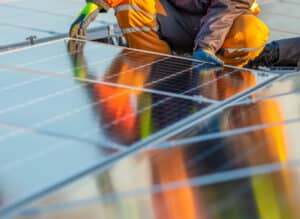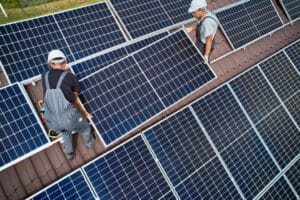Solar Panel Company vs Off-Grid vs Grid-Tied Solar Systems
With the increasing focus on sustainability and renewable energy, solar power has emerged as a popular choice for homeowners looking to reduce their carbon footprint and save on energy costs. However, when it comes to implementing solar energy, two primary options stand out: off-grid and grid-tied solar systems.
Know more about the differences, benefits, and considerations of both systems that you can obtain from a solar panel company.
Off-Grid Solar Systems: Energy Independence and Self-Sufficiency
Off-grid solar systems, also known as standalone systems, operate independently from the utility grid. They are designed to generate and store their own energy using solar panels and battery storage. These systems are ideal for homeowners seeking energy independence and those in remote locations without access to the grid.
Advantages of Off-Grid Solar Systems:
- Energy Independence: Off-grid systems liberate homeowners from relying on utility companies for electricity, providing autonomy over energy production and consumption.
- Remote Locations: They are perfect for homes located in remote areas where connecting to the grid is either expensive or not feasible.
- Backup Power: Battery storage allows homeowners to store excess energy generated during the day for use during the night or cloudy days, providing a reliable backup power source.
- Reduced Energy Costs: Over time, off-grid systems can lead to significant savings on electricity bills, as they eliminate the need to purchase power from utility companies.
Considerations for Off-Grid Systems:
- Higher Initial Investment: Off-grid systems require upfront investments in solar panels, batteries, and other equipment, making the initial cost higher compared to grid-tied systems.
- System Sizing: Properly sizing the system and batteries is crucial to ensure adequate energy production and storage for your needs.
Grid-Tied Solar Systems: Efficiency and Connectivity
Grid-tied solar systems are connected to the utility grid and work in tandem with it. They allow homeowners to generate their own electricity from solar panels while remaining connected to the grid for backup power and excess energy exchange.
Advantages of Grid-Tied Solar Systems:
- Reduced Initial Costs: Grid-tied systems typically have lower upfront costs as they don’t require extensive battery storage.
- Net Metering: Homeowners can take advantage of net metering, a system that allows them to sell excess energy back to the grid and receive credits on their electricity bill.
- Energy Security: While not entirely off-grid, grid-tied systems provide a level of energy security during grid outages, as they can draw power from the grid when needed.
Considerations for Grid-Tied Systems:
- Dependency on the Grid: Grid-tied systems are still reliant on the utility grid for consistent power supply, meaning they may not function during power outages.
- Limited Autonomy: Homeowners have less control over their energy production and consumption compared to off-grid systems.
- Net Metering Regulations: The benefits of net metering vary based on regional regulations and utility companies policies.
Making the Right Choice
The decision between off-grid and grid-tied solar systems depends on your energy goals, location, budget, and lifestyle.

Choose an Off-Grid System If:
- You live in a remote area with limited access to the grid.
- You value energy, independence and self-sufficiency.
- You’re willing to make a higher initial investment for long-term energy savings.
- You’re interested in having a backup power source during grid outages.
Choose a Grid-Tied System If:
- You want to reduce your electricity bills while remaining connected to the grid.
- You’re interested in taking advantage of net metering incentives.
- You prefer a lower initial investment and simpler operation.
- You prioritize energy security during grid outages.
Conclusion
Both off-grid and grid-tied solar systems offer unique benefits and considerations. The decision ultimately comes down to your energy goals, location, budget and the accessibility of both systems from your nearest solar panel company. Whether you opt for energy independence with an off-grid system or choose the efficiency and connectivity of a grid-tied system, transitioning to solar energy is a significant step towards a greener and more sustainable future. Consulting with solar energy professionals can provide personalized insights and help you make an informed choice that aligns with your needs and values.
Experience the EVOLVsolar difference by contacting our corporate office today at (587) 602-0534.



